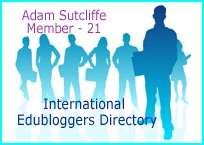I was going to call this post "A Negative View of the Web by Academia", but then I read on and around my subject and this is what I found. This is how an article from Mashable starts:
University Of Brighton Professor Places Ban On Google And Wikipedia
January 13, 2008 — 08:06 AM PST — by — Share This

So I read on and find out that a university professor at the University of Brighton has banned her students from using these tools for their research because " professor Tara Brabazon claims that students have grown too accustomed to taking
“the easy option when asked to do research.” "
And that is it with regard to direct quotes from the original source of the article. This Mashable piece goes on to decry academics, particularly in the fields of history, literature, science etc as almost Luddite in their fear of new technology. Apparently these educators fear the Chaos and will revert back to the "officially approved" doctrine.
Now, because this article interested me it almost prompted me to write a rant, but I thought ,"No, I'd better get more info," so I clicked the hyperlink shown in the picture below.
This took me to this headline from The Argus: Lecturer bans students from using Google and Wikipedia.
This article starts off in a similar vein until we get to the quotes from Professor Tara Brabazon:
"Too many students don't use their own brains enough. We need to bring back the important values of research and analysis."
She said young people were finishing education with shallow ideas and
needed to learn interpretative skills before starting to use technology.
The article goes on to explain that Professor Brabazon is giving a lecture locally entitled, Google is White Bread for the Masses.
Now it is obvious that Prof. Brabazon does not particularly like her students using these tools for their research but I feel that her main bugbear is that students are using them, and them alone as their research. To my mind she trying to encourage a sense of academic rigour into her students, who seem to believe the first Google find or Wikipedia page they see. She is trying to get her students to go beyond those original sources.
I then went on to (ironically) google Prof Brabazon. Very interesting to say the least what she lectures on:
Tara Brabazon is Professor of Media at the University of Brighton, United Kingdom.
Not only is she no Luddite she lectures on subjects such as "Thinking Pop and Creative Industries". She also holds a Graduate Diploma in Internet Studies and has written 10 books, including The University of Google: Education in a (post) information age.
Google is a
Interesting eh? Obviously this professor knows a heck of a lot more about this than you would have believed from the first article.
brand name that has transformed into a verb for web searching. The
word has also entered popular culture. But an absence in this
narrative of commercial success is the impact of Google on education.
Googling signals simple and intuitive surfing, rather than planned
researching, and quick answers to difficult questions. The costs and
consequences of students entering this digital shopping mall for
research, scholarship and interpretation require attention.
This is what I had to do to write this post. And this is what Prof Brabazon is trying to get her students to do(ish). If I'd have simply written a commentary on the mashable article I would only have seen half the story, whereas by finding the original article and looking up the person concerned I got the whole story.
And I'm rather pleased with myself about that.
Did you like the title???
Technorati Tags: tarabrabazon, adamsutcliffe, google, mashable, wikipedia, research, universityofbrighton
Powered by ScribeFire.

































 All
collective / participatory projects which use mobile technologies such
as mobile communications terminals, small digital cameras, etc. and
which result in an audiovisual presentation or diffusion of : films,
news reporting, video blogs, video casts, webTV...
All
collective / participatory projects which use mobile technologies such
as mobile communications terminals, small digital cameras, etc. and
which result in an audiovisual presentation or diffusion of : films,
news reporting, video blogs, video casts, webTV...

Recent Comments